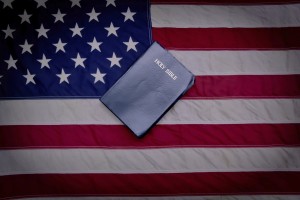
The big news in the LGBT community over the past couple of weeks has been the religious freedom laws in Georgia, North Carolina, and Mississippi. In each state, bills were introduced into the legislature to protect businesses and individuals who do not support same-sex marriage. Proponents argue that these bills are necessary to protect the First Amendment rights of people who do not want to do business with the LGBT community when it comes to weddings. Opponents argue that these bills permit discrimination. It seems as if the civil rights of the LGBT community and the religious freedom of the First Amendment are on a collision course that will not end well for one group. Surely, there has to be a solution to allow everyone to live in harmony?
Where Did This Start?
Although the rash of religious freedom bills seems new to America, the clash between religious freedom and government has been going on for a long time. In 1993, the Religious Freedom Restoration Act (RFRA) was passed in reaction to two different cases. In the first, Employment Division v. Smith, SCOTUS upheld the rights of the state (Oregon) to deny unemployment benefits to Native Americans who had been fired from their jobs after testing positive for mescaline. The argument was that it was part of their religious beliefs. In the second case, Lyng v. Northwest Indian Cemetery Protective Association, the tribes were trying to prevent the U.S. Forest Service from building a road through their sacred land. In Lyng, the court ruled against the tribes, stating that the government was not “coercing or punishing them for their religious beliefs.”
Surprisingly, liberal groups such as the ACLU and American Jewish Congress, as well as conservative groups such as the Christian Legal Society and the Traditional Values Coalition, were outraged over the decisions in Lyng and Smith. The main argument was that the decisions burdened a religion. In response, the RFRA passed the House and Senate with only three votes in dissent. The Supreme Court had acknowledged the protection of First Amendment religious freedom rights, but the RFRA went one step further to ensure that laws would not “unfairly burden the practice of religion.” The RFRA has been used to protect the rights of Christians, and even though it has been challenged multiple times in federal court, the act still stands. In 2006, the Court upheld the act as it applies to Federal law, but the states have not been so fortunate.
Why Do States Need Religious Freedom Protections?
Four years after the RFRA was passed, it was held unconstitutional as it applied to states. City of Boerne v. Flores challenged the RFRA when the Catholic Archbishop (Flores) wanted to enlarge St. Peter’s Church. The permit was denied because the church was in an historic district that did not allow additions or new construction. Flores brought suit, citing the RFRA, stating that the laws unfairly burdened the free exercise of religion. The City of Boerne was successful in District Court, but Flores appealed the decision to the U.S. Court of Appeals, which upheld the RFRA as it applied to state laws. Boerne then filed a certiorari petition to the U.S. Supreme Court, with support from the National Trust for Historic Preservation. SCOTUS revered the Appeals’ Court decision and ruled in Boerne’s favor.
Since that time, 21 states have passed religious freedom acts that mirror the RFRA. Ideally, these bills offer protection to everyone in pursuit of their religion. However, many religious faiths, not only Christians, have not accepted the rights of the LGBT community, which is putting the two factions at odds with the law. As legal challenges work their way through the courts, hopefully Americans can make sense of fairness for everyone.

